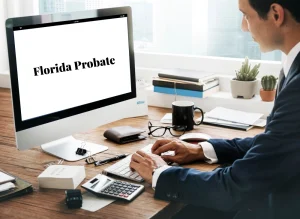
Being appointed to execute an estate in Florida is an honor (as well as a duty that needs to be fulfilled, which entails you to walk through the process of probate carefully in Florida). Probate may be complicated and knowing what to anticipate in 2025 will assist you to make sure that you do not overlook your duties and carry them out effectively and efficiently. The guide will outline the key actions needed as well as possible setbacks and traps that executors may encounter when going through the process of probate in Florida.
What is Probate in Florida?
The legal process of giving away the estate left by a deceased person, payment of debts and proving the will before a court in Florida is known as probate. You as an executor have the responsibility of supervising the management of the estate, which might involve managing the property of the deceased, settling the debts and distributing the estate among the beneficiaries.
In Florida, there are two primary types of probate administration: formal administration and summary administration. Summary administration is available for estates with less than $75,000 in assets or if the decedent has been dead for more than two years. Formal administration is the more common process, which applies to estates that don’t meet these criteria.
1. The Role of an Executor in Florida Probate
As an executor, you’re the person responsible for administering the estate according to the decedent’s wishes. In 2025, your duties will likely include:
- Filing the Will: The initial part is filing the decedent’s will with the probate court. If there is no will, Florida law provides a hierarchy of heirs for distribution.
- Gathering Assets: You’ll need to identify and secure all assets of the decedent, which could range from real estate to bank accounts, insurance policies, and more.
- Paying Debts and Taxes:The debts payable to the estate such as final medical expenses, funeral expenses, taxes etc. have also to be paid off before allocating the assets. Most estates do not need to be concerned with Florida estate taxes because they apply to estates in excess of 11.7 million, although they are one type of liability that should be considered along with other claims to the estate that is not Medicaid (such as Medicaid claims).
- Distributing the Estate: After settling all debts and expenses, the remaining assets should be allocated to the appropriate heirs, either based on the provisions stated in the will or, in the absence of a will, following Florida’s intestacy guidelines.
2. The Timeline of Florida Probate in 2025
Understanding the timeline of probate is essential. While every probate case is unique, in general, the process can take anywhere from 6 months to a year. The following steps contribute to this timeline:
- Filing the Petition: The availability of the petition to probate commences with filling of the petition, a process that might take a number of weeks before actualization.
- Creditor Claims: Florida law provides a 3-month period for creditors to make claims against the estate. If claims arise, you’ll need to handle them appropriately before moving forward.
- Final Distribution: Once all debts are paid and any legal issues are resolved, the estate can be distributed. If there are no complications, this can take another 2-3 months.
In 2025, the timeframe might vary slightly depending on how the courts manage probate cases. Florida probate courts are striving to modernize and streamline processes, so digital filings and technology-driven solutions might speed up certain steps.
3. Key Considerations for Executors in 2025
Being an executor in 2025 presents several challenges, especially as estate law evolves. Some key considerations include:
- Navigating Florida’s New Estate Tax Rules: Florida does not impose a state estate tax, but that doesn’t mean you shouldn’t stay updated on federal tax law changes. Executors should be mindful of federal estate tax exemptions and how they may impact the estate’s tax responsibilities.
- Electronic Wills: Florida has recently embraced electronic wills, making it easier for individuals to draft, sign, and store their will electronically. As an executor, you may encounter an electronic will, and understanding the rules surrounding these modern documents is crucial.
- Family Disputes: Florida probate law allows family members to challenge a will, particularly if there are concerns about the decedent’s mental state or the presence of a more recent will. Handling these disputes can delay the probate process.
- Real Property Considerations: If the estate includes real property, you may need to address issues like quitclaim deeds, title transfers, and the sale of properties to beneficiaries or third parties. Real estate in probate can sometimes be complicated, and consulting an attorney is wise.
- Florida Homestead Property: Florida has a homestead exemption that may complicate the probate process for property that is designated as a homestead. The law provides specific protections to surviving spouses and children, and you must carefully navigate these provisions.
4. Common Probate Pitfalls and How to Avoid Them
As an executor, it’s crucial to avoid common mistakes that can delay the probate process and even result in personal liability. Some common pitfalls to watch out for include:
- Failing to Notify Creditors: Failing to notify creditors within the required 3-month window can result in the estate being liable for unpaid debts that should have been settled.
- Improper Handling of Assets: Executors have a fiduciary duty to protect the estate’s assets. Mismanaging assets or failing to secure valuable items can result in personal liability.
- Not Seeking Legal Advice: Florida probate can be tricky, especially when dealing with estate taxes, creditor claims, and will disputes. Always consult with a Florida probate attorney to ensure you’re following the law and protecting your interests.
5. Florida Probate Resources for Executors in 2025
There are several resources that can make your job easier as an executor:
- Florida Probate Court Website: The Florida probate court system has a lot of resources for executors, including information on probate forms, procedures, and guidelines.
- Probate Attorneys: Hiring a probate attorney can help navigate complex situations. Attorneys provide guidance on legal documents, disputes, and taxes, ensuring that you don’t make costly mistakes.
- Financial Advisors: If the estate involves significant financial assets, a financial advisor can assist with tax planning, investment management, and asset distribution.
Conclusion
It is a significant position to which a person was appointed as an executor in Florida both with responsibility and challenge. Being aware of what is going to happen by 2025 can make you handle the probate procedure efficiently and prevent wastes of time and difficulties. With knowledge, professional advice and adherence to laws in the State of Florida in the probate procedures, the estate of the decedent may be administered in the wish of the decedent and according to the requirements of the law.



